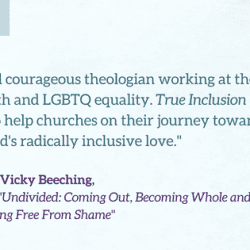Guest Post by Duane Beachey, Author Reading the Bible As If Jesus Mattered
I read Sam Harris’ book, Letter to a Christian Nation. Harris is among contemporary atheists who have authored books to convince people of  atheist beliefs. It’s an interesting book. He’s right about some things. I’d have to say that I couldn’t believe in some of the descriptions of God he offers either. He highlights the worst abuses of people of faith and blames the religion itself for those abuses. He points out Christians who burned heretics at the stake and Muslims who are terrorists then says both were actually taking their sacred texts literally. Therefore religion itself is the problem.
atheist beliefs. It’s an interesting book. He’s right about some things. I’d have to say that I couldn’t believe in some of the descriptions of God he offers either. He highlights the worst abuses of people of faith and blames the religion itself for those abuses. He points out Christians who burned heretics at the stake and Muslims who are terrorists then says both were actually taking their sacred texts literally. Therefore religion itself is the problem.
Indeed he is right that when people of any religion use their religion to justify crusades or inquisitions or terrorism, the results are atrocities. Harris correctly emphasizes that much of what we’ve done in the name of Christianity (and Islam) hasn’t been very loving or kind.
Indeed as has often been pointed out, if we took literally biblical commands from the God of the Old Testament, we would still be stoning disobedient children, the adulterous, and the infidel. But Christians today, and Jews for that matter, are pretty much unanimous in rejecting such punishments. We don’t feel such biblical mandates should still be practiced.
That leaves us with the problem of how to understand these passages from our shared spiritual past. Were the early Israelites misguided? Was theirs the normal justice of an earlier time? Was God stricter under Torah law than under grace? Was their view of God incomplete and imperfect? Or were they just plain wrong about what God wanted?
These questions of how to understand our Scriptures go to the heart of our faith understandings, which is why disagreements about Scripture are some of the most difficult and divisive. I’ll say more in a later chapter about how we understand Scripture.
Muslims also disagree on how to understand similar harsh punishments in the Koran. Like Christians and Jews, many Muslims today do not believe such punishments should still be carried out—though it seems more Muslims than Christians or Jews still embrace the harsh penalties prescribed in sharia law based on their Scriptures.
Much of Sam Harris’ argument is still the original philosophical standoff that says you can’t prove God exists and the counter argument that you can’t prove God doesn’t exist. While Christians may look at the complexity and beauty of creation and see that as proof of God’s existence, Harris looks at all the tragedy and disease in the natural world and sees those as proof that a loving God could never have designed such a brutal unfeeling universe.
Some of Harris’ critiques of Christianity need to be taken seriously. I think he points out some of the problems with the religious beliefs we have attached to Christianity. In an interview with Sam Harris and Rick Warren in the April 9, 2007 Newsweek, Harris asks how it is fair “to have created a [religious] system where belief is the crucial piece, rather than being a good person?” Rick Warren doesn’t contest this characterization of Christianity (p. 63). In fact, Jesus insists that belief or confession of him as Lord, without obedience to his teaching, is useless.
I thought Harris had some interesting observations about belief and unbelief. He makes the point that most of us are atheists and non-believers—in relation to the faith of other people. Christians don’t look at the Koran and believe it is God’s Word at all. Most would believe it is just a book written by Mohammad; it may contain some wisdom and truth but also passages we would take issue with. Most Christians would feel the same way about the wisdom of Buddha or the Book of Mormon. We don’t believe God inspired them at all and may wonder how anyone could.
In the same way Muslims are atheists in relation to much of the New Testament. They may also claim Abraham as their father and see the Torah but not much of the New Testament as revealed Word. They may well claim Jesus as a messenger from God who preceded Mohammad, but they don’t see passages about Jesus as Son of God or his death and resurrection as God’s Word at all.
I was speaking to a Muslim at an interfaith dialogue and was surprised when he said, “As Jesus himself once said, . . . ” and proceeded to quote Jesus saying something I’d never heard in my life. Turns out it was a quote from the Koran which says that Jesus said those words. I don’t remember at all what he said but do recall wondering why anyone would go to the Koran for quotes from Jesus. Of course the reason is obvious; we each have different sources of authority. He believed the Koran has authority, and I believe the Bible does.
While Sam Harris may be right that most of us don’t believe the scriptures of the other, he didn’t convince me that there is therefore no true religion, no authoritative book, and no God. I’m sure he also hasn’t convinced many Muslims of that, or Mormons, Buddhists, or Hindus either. We are not easily moved from our beliefs, especially our religious beliefs. Those things we believe to be ultimately true are often the most unshakeable. It takes a lot to pry us loose enough even to question our beliefs, let alone change them. For the apostle Paul it took a blinding light and the voice of Jesus to change what he was absolutely sure he was right about.
And here is why I am hopeful that some of us may consider rethinking our faith understandings. I believe we Christians agree on the centrality of Christ to the Christian faith. The central belief of the Christian faith is that the transcendent God is made known to us most fully in Jesus who lived and taught among us—who we heard and saw with our own eyes, and who our hands have touched (1 John 1:1). The One who is beyond all seeing and knowing has become visible and is made known in Jesus the Christ:
The Son is the image of the invisible God, the firstborn over all creation. For in him all things were created: things in heaven and on earth, visible and invisible, whether thrones or powers or rulers or authorities; all things have been created through him and for him. He is before all things, and in him all things hold together. (Col. 1:15-17)
Everything fits together in Jesus alone. Nothing trumps Jesus. All that I am and have—all my belongings, all my relationships, all my beliefs, my philosophies, my politics, and especially my understanding of God and the Bible—all are subservient to Jesus. All kings and governing authorities are subservient to him. The Christian confession of the early church, “Jesus is Lord,” stood in direct opposition to Rome’s claim, “Caesar is Lord.” Paul is clear that we can pledge no other allegiance nor have any higher authority, because everything else is subservient to Jesus.
We can only truly understand the words of Scripture in light of the words of Jesus. But over and over Christians explain Jesus in light of some other part of the Bible. Or we just allow our “common sense”—the world’s wisdom—to convince us we can’t possibly do what Jesus says or that he didn’t mean what he taught in any way that actually applies to our current situation.
This post is an excerpt from Duane Beacheys new book Reading the Bible As If Jesus Mattered. To read more, order his book today by clicking here.
“Reading the Bible as if Jesus Mattered is one of the most accessible and powerful manifestos on what it means to be a faithful, biblically grounded disciple of Jesus that I have ever read. Beachey approaches the Scriptures with Jesus as his interpretive lens and paints a stunning picture of what true Christianity should look like. This book is a must read for all followers of Christ, no matter where you fall on the theological spectrum, and will inspire you to commit yourself again to the way of Jesus, the liberating Prince of Peace.”
–Brandan Robertson, founder, The Revangelical Movement,
Endorsement from Book Cover











